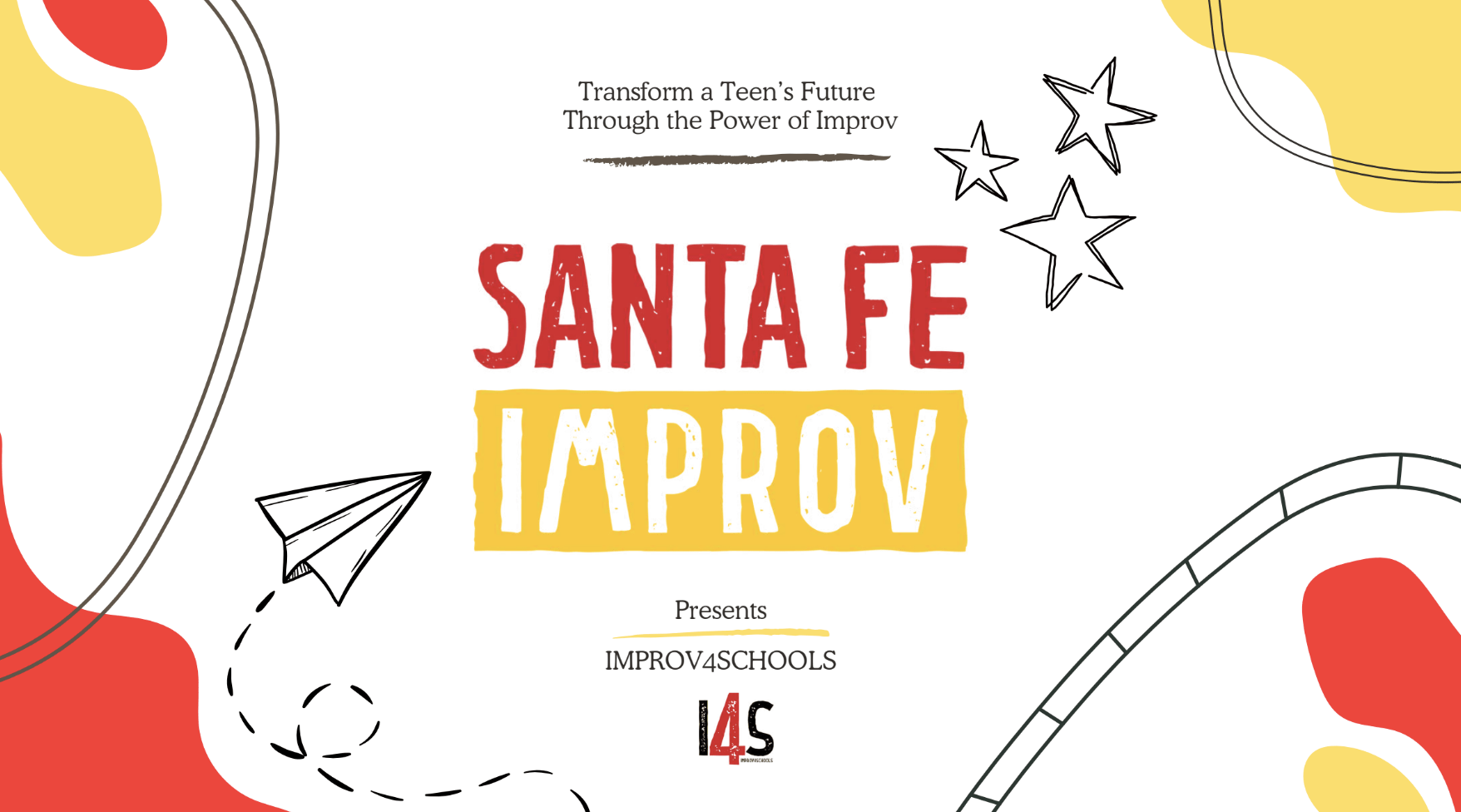
Community Programs
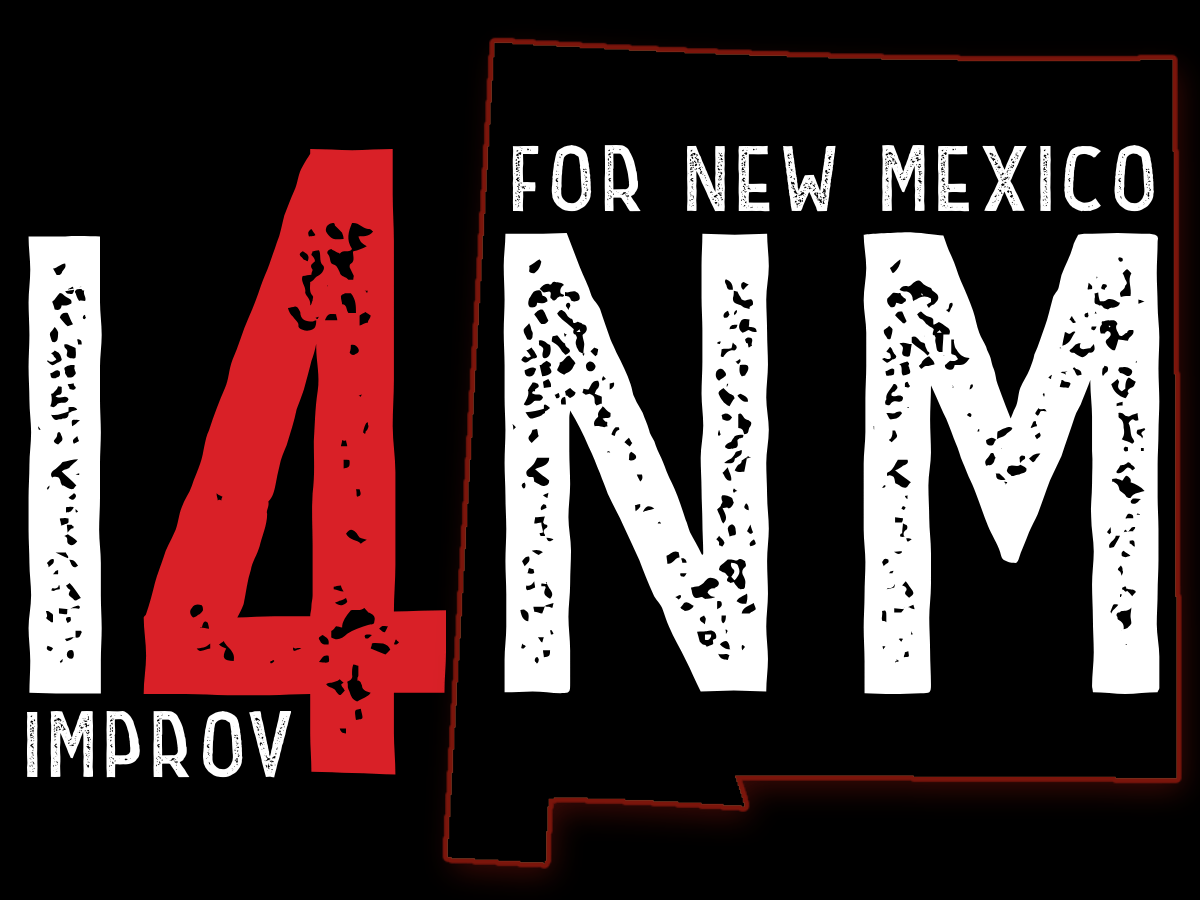
Improv4Schools
Improv4NewMexico
Santa Fe Improv engages with the New Mexico community through our Improv4NewMexico™ initiative.
- Improv4Educators™ – teacher training program – teaching school teachers improv skills so they can use them in class. Teachers of our Improv4Schools middle and high school students can qualify for a full scholarship in order to take the adult Santa Fe Improv curriculum, Levels 1-5, free of charge, beginning January 2025.
- Improv4Schools™- teaching improv to middle and high school teens, providing life skills and anxiety reduction through improv at no cost to the public schools or the students.
- Improv4Teens™ – continued programming for students who wish to take their improv to the next level while school is out. Camps and afterschool classes take place at the Santa Fe Improv theater. Scholarships and sliding scales available.
These programs use an integrated approach to educating through improv. We teach improv to teens directly within a public school setting, and we train teachers to use improv in the classroom to facilitate learning. Teens are invited to perform in a student jam and showcase at the end of each semester and show their improv skills to family and friends in our theater.
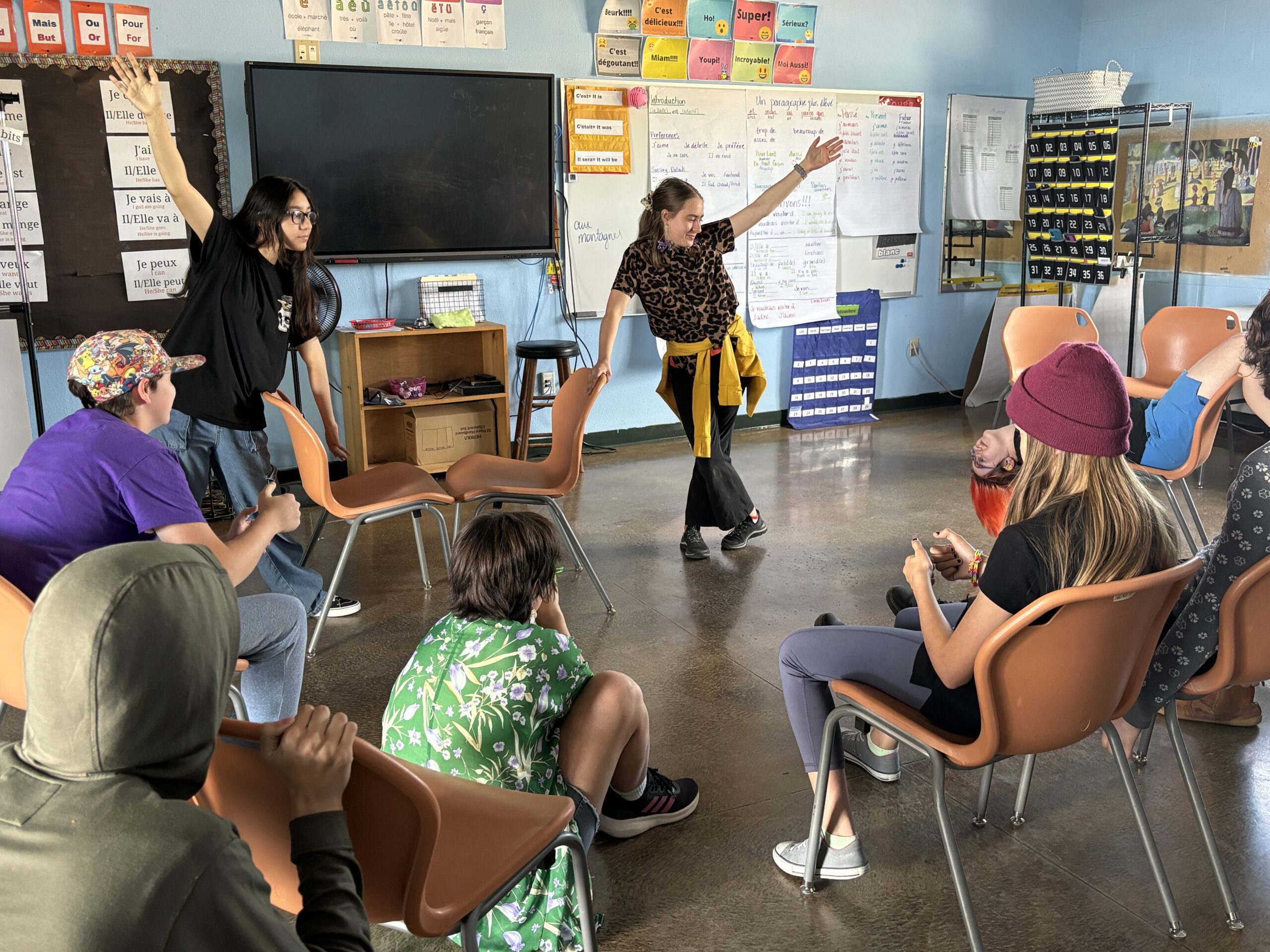
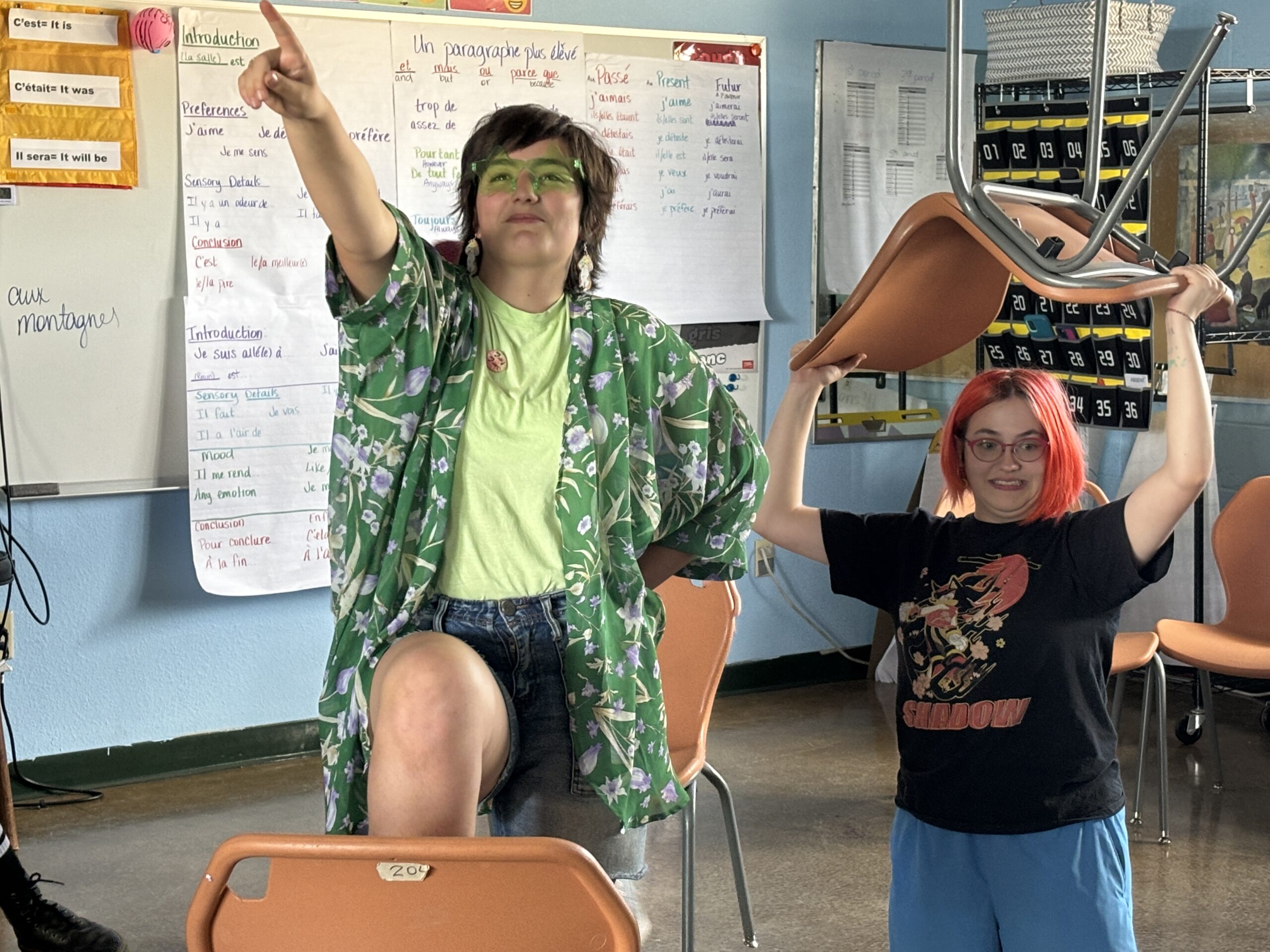
Here’s why we are doing this:
- For students: while kids and teens are learning social, emotional, and executive function skills, it doesn’t feel like school – it just feels like a new way to play and have fun – but change is happening.
- For teachers: being able to engage students and actually teach reduces anxiety and increases job satisfaction.
- For administrators: improv is inexpensive to program – no sets, no costumes, no computers, no lights, no sound systems, no scripts to memorize. All we need is a room with space to move around and a door that closes.
The problem
Teachers are burned out, and students are anxious and disengaged.
- According to a 2022 Gallup poll:
- 44% of American K-12 teachers feel burned out often or always.
- 29.8% say they’d leave their job if they could get a higher-paying job.
- 21.4% think about staying home from school because they’re too tired.
- In New Mexico specifically, 33.7% of teachers say they don’t have as much enthusiasm for their job as when they started.
On the student side of the equation, New Mexico deals with a growing absentee problem. And, when students are in attendance, they may be struggling with environmental stressors and anxiety that lead them to tune out or act out. A 2019 study conducted specifically with middle and high school-age youth, across a ten-week period, published by Dr. Peter Felsman, indicated the following:
- Teens screened for social phobia showed reduced anxiety after improv training.
- Reduced anxiety was correlated with improved social skills, hope, and creativity.
- Students who were more engaged in the program showed the greatest benefit.
- Students agreed that improvisational training was useful in life outside of class.
A 2023 study, co-authored by Eric Weiss, Santa Fe Improv, showed improv could reduce burnout in participants.
“It was a great learning opportunity, a fun time with people that I didn’t know to have a good social experience”
- Key Outcome: Social Connection
- Growth Area: Peer Relationships
- Impact: Community Building
- Key Outcome: New Competencies
- Growth Area: Technical Knowledge
- Impact: Expanded Performance Capabilities
- Key Outcome: Anxiety Management
- Growth Area: Social Confidence
- Impact: Personal Barrier Breakthrough
The approach? Improv4Schools™
Beginning fall of 2024, SFI offered the program to three public schools in Santa Fe: Capital High, ATC, and Mandela International Magnet School. The program is free to the school and to the students. Our teachers (in pairs) can work with a class of up to thirty middle school and high school students to teach them core improvisational skills. SFI will expand its reach to include more schools in 2025 like Santa Fe High, Rio Grande, and likely Aspen. Our programs at Capital and Santa Fe High are bilingual.
The Goal
The goal of our multi-week Improv4Schools™ program is to teach core improv skills to a group of young people who can then apply those skills in their daily lives. Improv teaches skills such as listening, being present, acceptance, and readiness for anything. These portable skills are learned almost immediately through improv. Studies indicate that improv reduces anxiety and increases coping mechanisms. Santa Fe Improv wishes to bring the gift of improv to the Santa Fe community at large, at low or no cost to young people. We also offer our teen students the opportunity to perform at the SFI theater at the end of their semester of learning. The show is free to the community and family members.
The Outcome
The outcome of our program is that students will have fun, develop portable life skills, and explore their creative talents. Improv is for everyone. Anyone can do it, and the benefits are universal. Students will strengthen friendships among their classmates, engage in teamwork, learn to speak in public, and conquer their fears.
Participate
This program is supported by grants and corporate donations. If you would like to sponsor SFI to offer this community-based work at no cost to the public schools, please contact us today. If you are an educator or principal and interested in having our program in your school in 2025, please reach out.
A Standout Model in Social and Emotional Learning (SEL)
How Improv4Schools compares to other educational interventions:
Typical academic interventions: 5-10% improvement
Standard SEL programs: 10-15% improvement
Our program: 18.5% improvement
Translation: We are achieving roughly 50% more impact than typical programs
In Everyday Terms: Imagine a student who:
Started the program by saying, “I am not sure I can handle unexpected changes”…
Ended by saying, “I am confident I can handle unexpected changes.”
This shift represents a fundamental change in self-perception and capability
The Figures
In just one semester, students taking the Improv4Schools program reported great improvement in core skills:
Communication Skills: +25%
Before: Students often hesitant to speak in groups
Real impact: More class participation, better presentations, stronger peer relationships
Adaptability: +22%
Before: Students stressed by schedule or plan changes
After: Flexibly handling unexpected situations
Real impact: Better handling of tests, projects, and daily challenges
Problem-Solving: +17%
Before: Students stuck with familiar solutions
After: Exploring creative alternatives
Real impact: More innovative approaches to schoolwork and social challenges
Teacher Perspective
When teachers see an 18.5% improvement in a student, they typically observe:
Students volunteering more frequently
More thoughtful class discussions
Better group project outcomes
Improved conflict resolution
More positive peer interactions
Bottom Line Impact
An 18.5% improvement means:
Students are markedly more confident
Skills are noticeably stronger
Changes are visible to teachers and parents
Improvements sustain over time
Impact extends beyond the classroom
This level of improvement is:
Statistically significant
Practically meaningful
Educationally valuable
Personally transformative
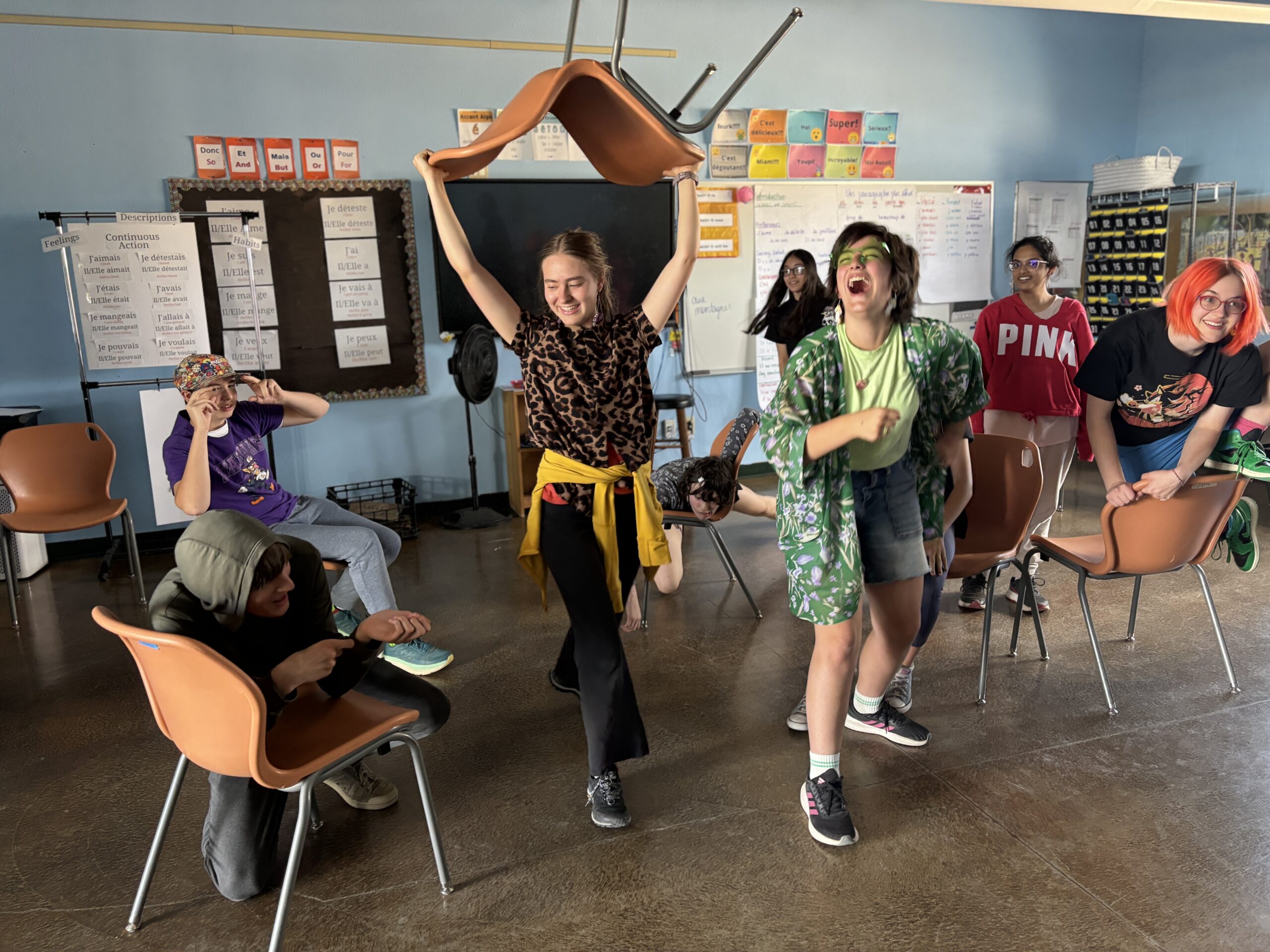
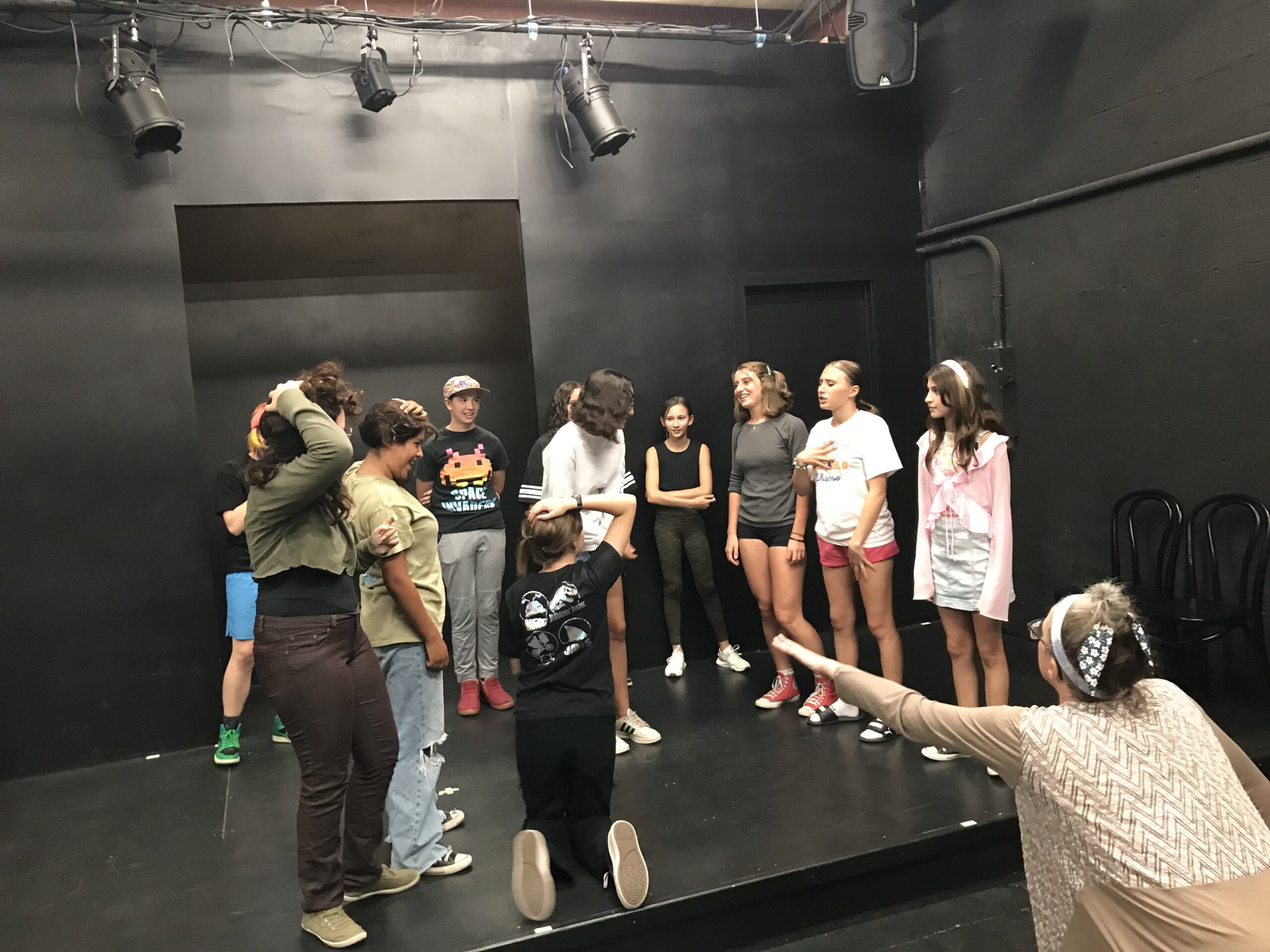
Teaching the Teachers: Improv4Educators™
We believe that educators want to enjoy teaching, and students (whether they realize it or not) want to enjoy learning. What’s needed is a way to make teaching and learning fun at the same time. Teachers need an easy-to-use, low-cost intervention that is efficient in re-engaging students. This “improv intervention” can prevent further learning loss and help close the growing knowledge, skills, and achievement gap. To address this need, SFI has launched our Improv4Educators initiative to complement our Improv4Schools curriculum. We can work with you to bring improv to your school and classroom. We will partner with you as we instruct your students during our Improv4Schools program at no cost to your students. You can participate in our circles and shadow us as we deliver our curriculum to your students. As we get to know you, and you get to know us, we can partner with you further to teach you improv games and exercises you can use with your students on an ongoing basis.
Teachers participating in Improv4Educators don’t need a background in improv or theater. You will learn improv warmups, games, scene work, and cool downs. Furthermore, you will be instructed on how to make these exercises work in the classroom—even with large groups of students. Teachers will leave this program with the training and materials to succeed once they’re back in class. And you will have follow-up support from the creative team at SFI so you can refine your approach in the field.
What if…?
- You’re a teacher who has an hour-long block in an afterschool program or free period and you want to engage them for an extended time period over multiple weeks? You will leave this class with a lesson plan for that.
- You want to do some team building to bring your students together on the first day of class? There’s a lesson plan for that, too.
- You only have 5 minutes at the top of class to build rapport and bring your class into alignment? Do an improv warmup to get them focused
- You need a quick way to jog creativity and spontaneity? Use a quick improv game to ignite the learning process.
- You want to help your students become better public speakers? There’s an improv monologue exercise to bring forth confidence and poise.
- You want to catalyze better collaboration in groups? Use an improv teambuilding exercise to drive convergent thinking.
Whether it is gaining back control of the classroom, creating rapport, building trust, sparking creativity, alleviating social anxiety, or just having fun. Improv will help.
The Outcome
The effects of this program should be two-fold:
- The teachers will “experience less burnout, increased tolerance of uncertainty, and enhanced playfulness, compassion, sense of joy, and connection to others” (Katzman, Weiss et al). When these teachers bring improv to the classroom, they will affect change in their students.
- The students will experience “increases in social skills, hope, creative self-efficacy, comfort performing for others, and willingness to make mistakes, along with marginal decreases in symptoms of depression” (Felsman et al).
If this program sounds like a good idea to you, consider becoming a donor. Your donation will help us to fund this pilot program and scale up to improve the lives of teachers and students all across New Mexico.
You can donate to SFI’s community programs by clicking here.
Sources
- Peter Felsman, Colleen M. Seifert, Joseph A. Himle, The use of improvisational theater training to reduce social anxiety in adolescents, The Arts in Psychotherapy, Volume 63, 2019, Pages 111-117.
- Katzman, J. , Weiss, E. , Ojeda, C. , Katzman, W. and Felsman, P. (2023) A Pilot Experience with Improvisational Theater to Reduce Burnout in Psychiatric Residency. Creative Education, 14, 1094-1110. doi: 10.4236/ce.2023.145070.

